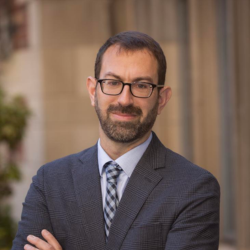
Please join the Political Theory Colloquium as they host Samuel Moyn, Henry R. Luce Professor of Jurisprudence at Yale Law School and Professor of History at Yale University, for a presentation titled "To Save Democracy from Juristocracy: J.B. Thayer and Congressional Power after the Civil War".
As many Americans once again worry that their democracy is hostage to judicial power, this Article is an archival reconstruction of how famed Harvard law professor James Bradley Thayer set out on a mission to stave off the syndrome before it stuck — though he failed in the end.
The Article shows how Thayer (1831-1902) arrived at his epochmaking theory of judicial deference to safeguard Congress’s power after democratic revolutions of the Civil War and Reconstruction. Indeed, he hoped to see America transformed in the direction of British legislative supremacy, in which Parliament — and not the courts — reigned supreme. Scandalized by growing ventures to weaponize the federal judiciary so as to preempt the newly federalized American democracy, Thayer bet on something new in global history: mass democracy on a national scale, understood as an experiment in collective learning. The Article thereby provides a new periodization and transatlantic contextualization of the struggles over judicial fiat routinely associated the Supreme Court’s defense of laissez-faire in the early twentieth century.
And yet, as this Article emphasizes, Thayer failed in the long run. His democratizing fix, judicial self-restraint under the “clear error standard” — which this Article shows had the same English roots as his democratic and parliamentary theory — has tragically misled reform. It embroiled Americans in a neverending debate on judicial “restraint,” even as Thayer proposed a doctrinal prescription encouraging judges to limit their power themselves. He therefore postponed an institutional remedy for an institutional syndrome. For this reason, his mission, in spite of its partial implementation after his death, now has to be rescued in its own right. Judicial self-restraint has not prevented the continuation and even the intensification of the very juristocratic syndrome Thayer rightly found so troubling. If Americans still remain with him at the dawn of our commitment to democracy, they will have to save it from judges in a new way all their own.
Samuel Moyn is Chancellor Kent Professor of Law and History at Yale University. He received a doctorate in modern European history from the University of California-Berkeley in 2000 and a law degree from Harvard University in 2001. He came to Yale from Harvard University, where he was Jeremiah Smith, Jr. Professor of Law and Professor of History. Before this, he spent 13 years in the Columbia University history department, where he was most recently James Bryce Professor of European Legal History.
His areas of interest in legal scholarship include international law, human rights, the law of war, and legal thought, in both historical and current perspective. In intellectual history, he has worked on a diverse range of subjects, especially twentieth-century European moral and political theory. He has written several books in his fields of European intellectual history and human rights history, including The Last Utopia: Human Rights in History (2010), and edited or coedited a number of others. His most recent books are Christian Human Rights (2015, based on Mellon Distinguished Lectures at the University of Pennsylvania in fall 2014) and Not Enough: Human Rights in an Unequal World (2018). His newest book is Humane: How the United States Abandoned Peace and Reinvented War (Farrar, Straus, and Giroux, 2021). Over the years, he has written in venues such as Boston Review, the Chronicle of Higher Education, Dissent, The Nation, The New Republic, The New York Times, and The Wall Street Journal.
Audience
- Faculty/Staff
- Student
- Post Docs/Docs
- Graduate Students
Interest
- Academic (general)